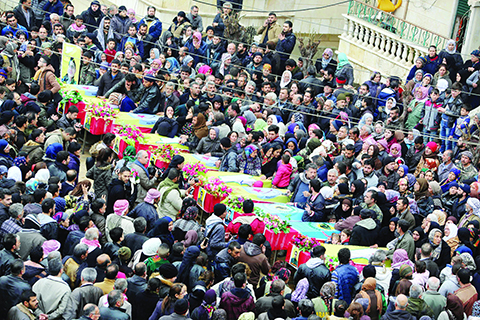AZAZ, Syria: Turkey yesterday urged the United States to withdraw personnel from a Kurdish-held town in northern Syria after Washington told Ankara it would stop arming a Syrian Kurdish militia that Turkey is fighting. As Turkey's offensive in Syria entered its second week with new air strikes and artillery, Foreign Minister Mevlut Cavusoglu said it was "necessary for them (US) to immediately withdraw from Manbij", where Washington has a military presence.
Turkey launched operation "Olive Branch" on Jan 20 against the Syrian Kurdish People's Protection Units (YPG) militia in its western enclave of Afrin, supporting Syrian opposition fighters with ground troops and air strikes. President Recep Tayyip Erdogan has threatened to expand the offensive against the YPG to Manbij, east of Afrin. Relations between NATO allies Ankara and Washington have worsened since Turkey launched an operation, with the United States urging restraint and fearing an impact on the fight against the Islamic State (IS) extremist group.
One of the issues marring relations was the US supplying the YPG militia - which has spearheaded the fight - with arms since last year in battles against IS. Manbij itself was retaken from IS by the Kurdish-led, US-backed Syrian Democratic Forces in 2016 as part of a push that would later recapture the city of Raqqa from the militants. The Turkish presidency said US National Security Advisor H R McMaster "confirmed" to Erdogan's spokesman Ibrahim Kalin in a phone call late Friday that Washington would no longer "give weapons to the YPG".
Ankara says the YPG is a "terrorist" offshoot of the outlawed Kurdistan Workers' Party (PKK) which is proscribed as a terror group by Ankara and its Western allies. "God willing we will crush them (terror groups) like a steamroller," Erdogan said yesterday during a speech in Istanbul. Turkish Prime Minister Binali Yildirim hit out at critics, explaining the "operation was not an option but a necessity".
'Cut ties with YPG'
Earlier this month, the US-led coalition fighting IS said it was working to create a 30,000-strong border security force in northern Syria. "The US must cut its ties with a terror organization. It must take back the weapons it has given," Cavusoglu said, adding Turkey "now wanted to see concrete steps taken". During their call, McMaster and Kalin agreed to coordinate closely in order to prevent misunderstandings.
The contact came just days after Washington and Ankara bitterly contested each other's accounts of a telephone conversation between Erdogan and US President Donald Trump. A White House statement said Trump urged Turkey to "limit its military actions", but a Turkish official said this was not an accurate reflection of the leaders' call. There have been expressions of concern over the offensive from other Western allies including the European Union. German police yesterday ordered the dispersal of a protest against the offensive attended by over 15,000 in Cologne because of the presence of PKK symbols, banned in Germany.
Syrian rebels 'take village'
The Syrian Observatory for Human Rights monitoring group told AFP the fighting was concentrated in the northwest part of the Afrin region. Turkish forces and allied Syrian rebels had taken a village and were making progress, albeit "slowly because of bad weather", Observatory head Rami Abdel Rahman said. An AFP correspondent in the Syrian town of Azaz held by pro-Ankara fighters, east of Afrin, could hear sporadic artillery fire.
The Turkish military said "at least 394 terrorist organization members were neutralized" in the operation. It was not possible to independently verify the toll. The Observatory said 111 Ankara-backed rebels and Kurdish fighters have been killed between both sides since last Saturday. It said 38 civilians have been killed, mainly as a result of Turkish shelling, but Ankara strongly rejects such claims. Health workers in Afrin told AFP they feared the offensive would lead to a humanitarian "tragedy". "Medication and humanitarian aid necessary to help civilians will soon run out," said Khalil Sabri Ahmed, head of the main hospital in Afrin.
The UN children's agency UNICEF said at least 11 children were killed since the operation began. Turkey's AFAD emergencies agency head Mehmet Gulluoglu said they were making plans for a camp to be established in Azaz "in the face of a possible refugee influx from Afrin". - AFP



